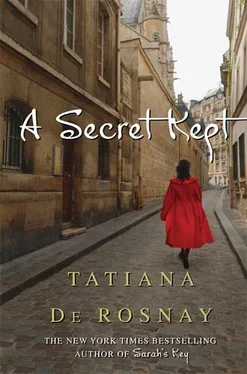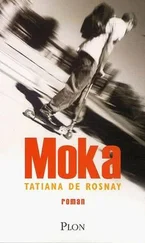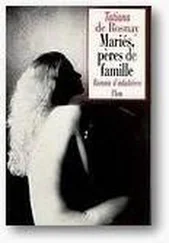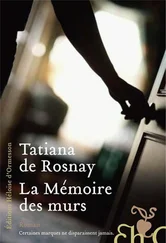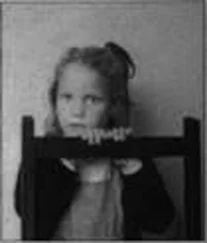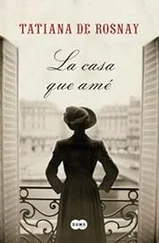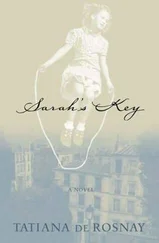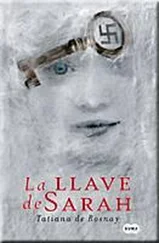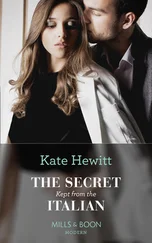If she is lying, she is an accomplished liar. Her eyes look right at me, unwavering. Her entire self is composed, unruffled. The message she is sending my way is clear: “Don’t ask any more questions.”
She walks away, her back as stiff as ever, carrying lilies. I return to the grand salon, noting that the room is full of people I have never met. I greet them politely.
Laurence Dardel, wearing a black suit that makes her look years older, unobtrusively hands me a brown envelope. The medical file. I thank her and put it away next to my coat, but I am itching to tear it open. Mélanie’s eyes follow me from afar, and I feel a pang of guilt. Soon, I tell myself, soon I will share all this with her. About June Ashby, the scrap with Blanche, the detective report.
I notice Astrid watching me as well, no doubt wondering why I look on edge. She is busy consoling Margaux, who was miserable during the funeral, for it brought back painful, fresh memories of Pauline.
Arno comes to stand next to me. He is home from boarding school to attend his great-grandmother’s funeral. His hair is shorter, cleaner, and he has shaved.
“Hey, Dad.”
He reaches out and pats my shoulder, goes over to the table where drinks and petits fours are laid out, and pours out a fruity beverage. After a longish spell of not talking to each other at all, apart from minimal conversation, our relationship has thawed out somewhat. I suspect the boarding school, with its strict hours, bracing hygiene, and vigorous, compulsory sports program, is doing him good. Astrid thinks so as well.
He leans toward me and whispers, “You know, those photographs. Margaux told me.”
“About my mother?”
“Yup. She explained. About the letter from the agency and everything. Heavy stuff.”
“How do you feel about it?”
He grins. “You mean about having a gay granny?”
I can’t help grinning too.
“Kinda cool when you think of it,” he says, “although I guess it wasn’t so cool for Grand-père.”
“No, I guess it wasn’t.”
“Kinda hard on a man’s pride, I’d say. You know, like, to have a wife who prefers girls?”
Coming from a sixteen-year-old, I find his observation both mature and relevant. How would I have reacted if Astrid was having an affair with a woman? Isn’t that the ultimate snub for a man? The most humiliating form of adultery? The true way to make a man feel anything but virile? But when I think of Serge and his hairy buttocks on Astrid’s camera, I somehow feel that nothing could be worse.
“How are things with Serge?” I inquire, keeping well out of Astrid’s range.
Arno wolfs down an entire chocolate éclair.
“Travels a lot.”
“And your mother? How is she?”
Arno peers at me, munching away. “Dunno. Ask her. She’s looking right at us.”
I pour myself some champagne as Gaspard rushes to assist me.
“When are you seeing Angèle again?” Arno asks.
The champagne tastes icy and bubbly on my tongue.
“In a couple of weeks.” And I nearly add, “I can’t wait.”
“Does she have kids?”
“No. She has a couple of nephews and nieces who are your age, I think.”
“Are you going to Nantes?”
“Yes. She doesn’t much like coming to Paris.”
“That’s a pity.”
“Why?”
He blushes. “She’s cool.”
I laugh and rumple his hair the way I used to when he was a kid.
“You’re right. She’s cool.”
The minutes tick by. Arno discusses his school, his new friends. I listen and nod. Then Astrid comes to talk to us. After a while Arno takes off for more food, and she and I are left en tête à tête. She seems happier. It appears that Serge and she have made a new start. I’m glad to hear it. I say so. She wants to know about Angèle, she is curious about her. She has heard so much about her from the children. Why don’t I bring her to Malakoff one evening for dinner? Sure, I say, but Angèle doesn’t come to Paris often. She likes to stick to her beloved Vendée.
And all of a sudden, despite the pleasant conversation with my wife, the kind of conversation I haven’t had with her for a while, it seems absolutely impossible not to peek right now, this very minute, at my mother’s medical file. There is no way I can wait till I get home.
I murmur something about going to the bathroom, back away, and inconspicuously pick up the envelope, slip it under my jacket, and dash to the large bathroom down the long corridor. Once inside, the door locked, I open it feverishly. Laurence Dardel has written a note.
Dear Antoine, please find enclosed your mother’s complete medical dossier. These are photocopies, as you may notice, but nothing has been omitted. My father’s notes are all there. I do feel this is not useful for you in any way, but you have a right, as Clarisse Rey’s son, to look at this file. If you have any further questions, please get back to me. All best, LD.
“Snobbish bitch,” I find myself muttering out loud. “Never liked her.”
The first document is the death certificate. I pore over it, turning the light on to see it better. Our mother indeed died at avenue Henri-Martin. Not avenue Kléber. “Cause of death: Aneurysm.” An unexpected thought comes to me. “Wait a minute…” I mumble aloud to myself. “Wait a minute…” February 12, 1974… we came home from school with the au pair in the afternoon… I was told, as soon as we arrived, by our father, that Clarisse suddenly died, that her body was at the hospital… I didn’t ask where she died. I naturally assumed she died at avenue Kléber. So I never asked. Neither did Mel.
I know I am right. Mélanie and I were not told, because we never asked. We were so small. We were in shock. I distinctly remember our father explaining about the aneurysm, how it happened, a vein bursting in the brain, how Clarisse had died, very quick, very fast, painlessly, but that’s all he ever said about her death. And if Gaspard had not committed that slip of the tongue, we would have gone on thinking that our mother died at avenue Kléber.
As I flip through the pages of the file, the doorknob rattles and startles me.
“Coming!” I say hastily, folding up the sheets of paper and hiding them under my jacket. I flush the toilet, turn on the tap, and wash my hands. When I open the door, Mélanie is waiting for me, her fists on her hips.
“What are you up to?” she asks. Her eyes dart around the room.
“Just thinking. About a couple of things,” I say, drying my hands busily.
“Are you hiding anything from me?”
“Of course not. I’m working on something, for both of us. I’m piecing it all together.”
She steps into the bathroom, closes the door quietly behind her. Once again I am struck by her resemblance to our mother.
“Listen to me, Antoine. Our father is dying.”
I stare at her. “He told you? About his cancer?”
She nods.
“Yes. He told me. Recently.”
“You never said anything to me.”
“He asked me not to.”
I gape at her, stunned. Then I hurl the towel to the ground, anger sparking through me.
“This is outrageous. I’m his son, for Christ’s sake.”
“I know how you must feel. But he cannot talk to you. He doesn’t know how. And you aren’t good at that with him either.”
I lean back against the wall and fold my arms across my chest. The anger bubbles up inside me. Fuming, I wait for her to speak.
“He hasn’t got much time, Antoine. He has stomach cancer. I spoke to his doctor. The news isn’t good.”
“What are you trying to tell me, Mélanie?”
She goes to the basin, opens the tap, passes her hands under the running water. She is wearing a dark gray wool dress, black tights, black patent leather flats with gold buckles. Her silvery streaked hair is tied back with a black velvet bow. She bends to retrieve the towel, wipes her hands.
Читать дальше
